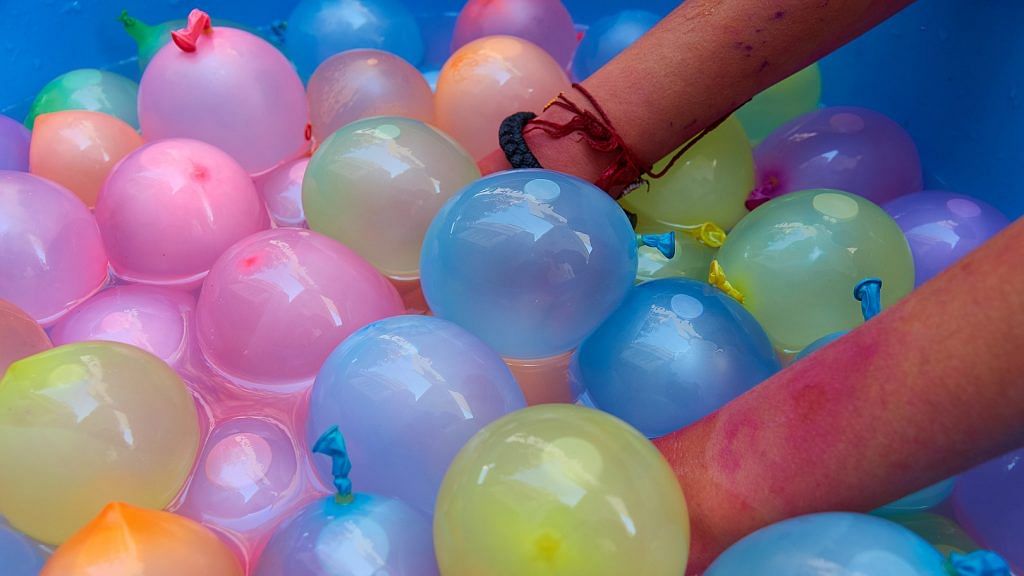If you utter the word ‘consent’ in India, people will immediately relate it to sex. While consent is, of course, the foundation of any form of sexual interaction, it is much more than that and does not necessarily involve explicit discussions. Take Holi, for example — the greatest day to learn about consent, for adults and children.
It is crucial that we understand consent and make children realise its importance before we get hit with water balloons. Festivals are supposed to be a way to unwind and unplug ourselves from our daily lives and enjoy as a community, not living in terror of being subjected to various forms of violation and harassment while simply walking on the street.
Also read: Semen-filled balloons or not, why is Holi a free pass to assault women in India?
Water balloons and Holi
If you live in North India, especially Delhi, you need to be hyperaware a week to 10 days before Holi — more so if you are a woman. You never know when a balloon filled with water will be thrown at you. And the worst bit is that it does not matter if you are walking or are in a rickshaw or public transport: if you are exposed, it will hit you.
Most of the ‘culprits’ throwing water balloons are children, who are sometimes even encouraged by parents, in the name of playing Holi. I have seen guardians tie balloons for their children, and later offering the ‘elderly’ excuse “Bura na maano holi hai (Don’t take offence, it’s Holi).”
Since the festival is a big deal in this part of India, schools also announce a two-day holiday, which means children have idle time to kill — they do that by pelting passersby with balloons from rooftops, balconies, and within gullies. The targets are obvious — women, domestic workers, labourers, or anyone less privileged or those who likely won’t make a fuss about or respond with abuse or violence. Basically, safe targets. Even so, one would rarely see men being targeted, especially if they are dressed up for work. The fear of being beaten up is strong there.
‘Bura na maano Holi hai’ is, of course, uttered immediately to neutralise the offence, annoyance, and the sheer sense of violation you experience right after a water balloon hits you. I, for one, stopped playing Holi altogether after a few years of my stay in Delhi and would not step out a day before the ‘D-day’ unless it was absolutely necessary. In fact, I was happy when Covid restrictions meant one could not celebrate this blatant trampling upon consent.
Also read: TalkPoint: Has Holi become a festival of fear for women?
Consent and children
The age of consent is defined as the age at which one is considered legally competent to consent for sexual activity. While you might believe that children throwing balloons are too young or are ‘just kids’ and are not aware of sexualisation or even sexuality, then you are way off the mark. In the age of ‘Digital India’, when children learn to operate smartphones before they learn their alphabets, their near-hypersexualisation is not really an anomaly.
The targeting of women’s breasts and buttocks while throwing water balloons is another hint that kids are not always innocent. Of course, they usually learn by imitating adults around them, supportive of and approving such behaviours, especially the male members, it is really no surprise that young kids take to such habits favourably too.
Molly Panda, a 38-year-old linguist recalls chasing two teenaged boys once in Delhi’s Malka Ganj, back in 2000, after they pelted her with five water balloons while she was in a rickshaw. The balloons hit her chest. The boys ran inside a house and she decided to ring the bell. The parents, she said, defended the kids and refused to apologise. She, however, held her ground and said that she would file an FIR against the parents if the boys did not apologise. They finally relented. But the message from the family and even the neighbours was clear – she was making a big deal out of ‘nothing’.
Such children may grow up to become people who believe in ‘bura na maano Holi hai’ and that violating someone’s personal space during festivals is ‘chalta hai’. It is time we teach children that ‘bura maano because consent nahi hai’ is the real deal.
Also read: Don’t tell women sexual harassment hurts Hindu pride, tell hooligans to leave Holi alone
Views are personal.
(Edited by Humra Laeeq)
